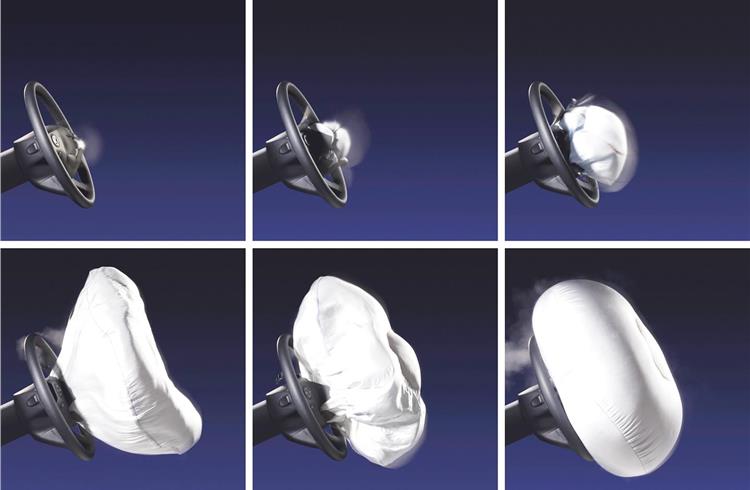Autocar Professional's May 15 issue – a Safety Special – out now
Autocar Professional's annual Safety Special is all about expert opinion on ways to reduce road accidents and save lives, technologies that can benefit India, exclusive interviews, and lots more.
With a projected growth rate of 7.4 percent, India will be the fastest growing economy in the world in 2018, according to the IMF. In 2019, that figure is expected to rise to 7.8 percent. A rising economy could lead to a better growth rate for the automobile industry. More two- and three-wheelers, cars, trucks and buses on roads. And, hopefully better roads.
In all of the above, growth indicates development. There is one area where a fall would contribute to the development of our country. A fall in road accident fatalities. Over 400 road users fail to return home in India every day. 146,000 deaths every year means irreparable loss to thousands of families, and a hit to the country's economy too. Which is why Autocar Professional brings out its Automotive Safety Special each year, in the second fortnight of May in sync with its webinar on the same subject.
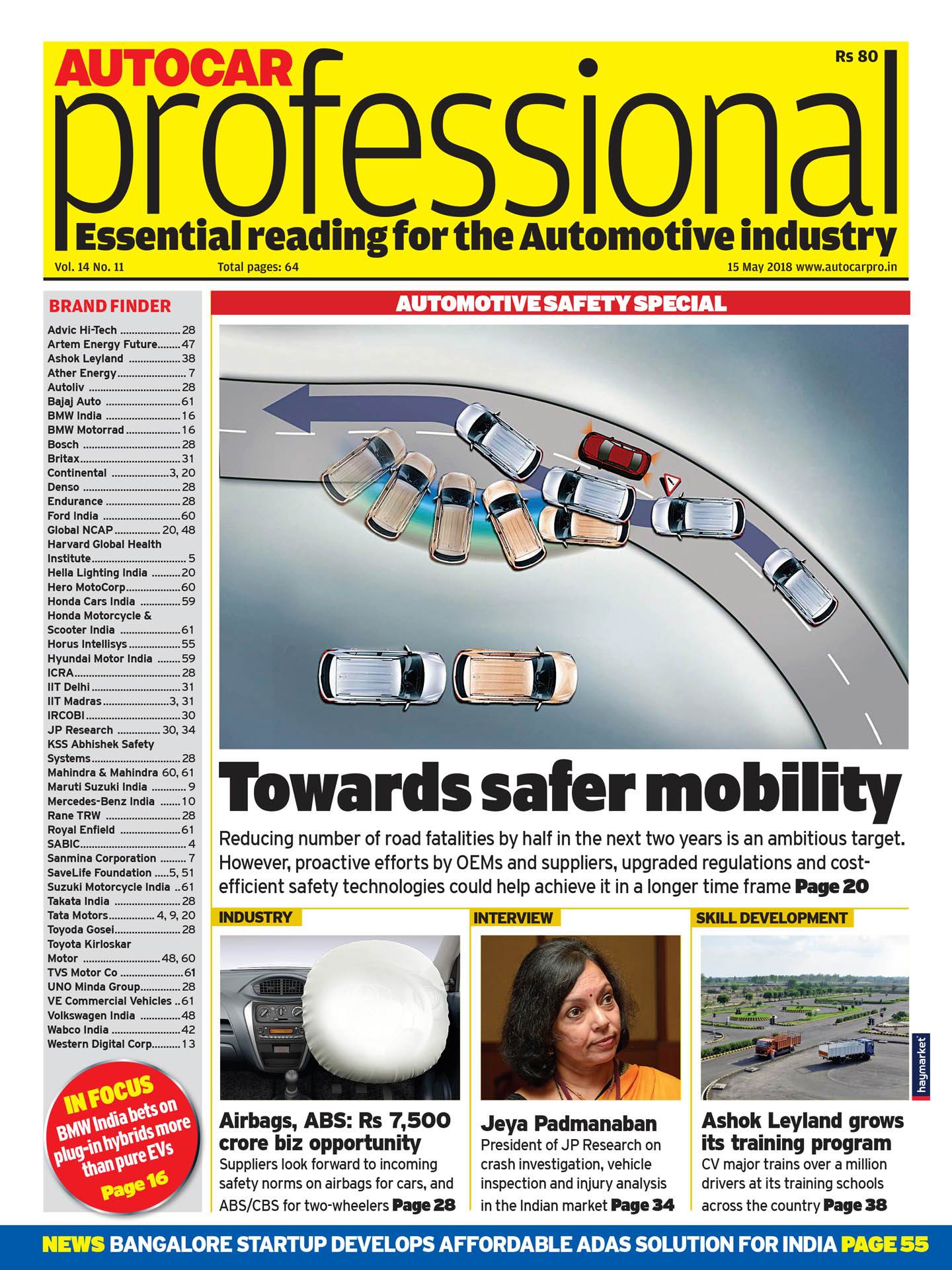
This year too, the webinar brought forth a lively debate among the top-notch panellists comprising David Ward, secretary general, Global NCAP; Jyotindran S Kutty, head - Vehicle Attributes and Technical Services, Tata Motors; Ramashankar Pandey, managing director, Hella India Lighting; and Alexander Klotz, head, India Technical Centre, Continental.
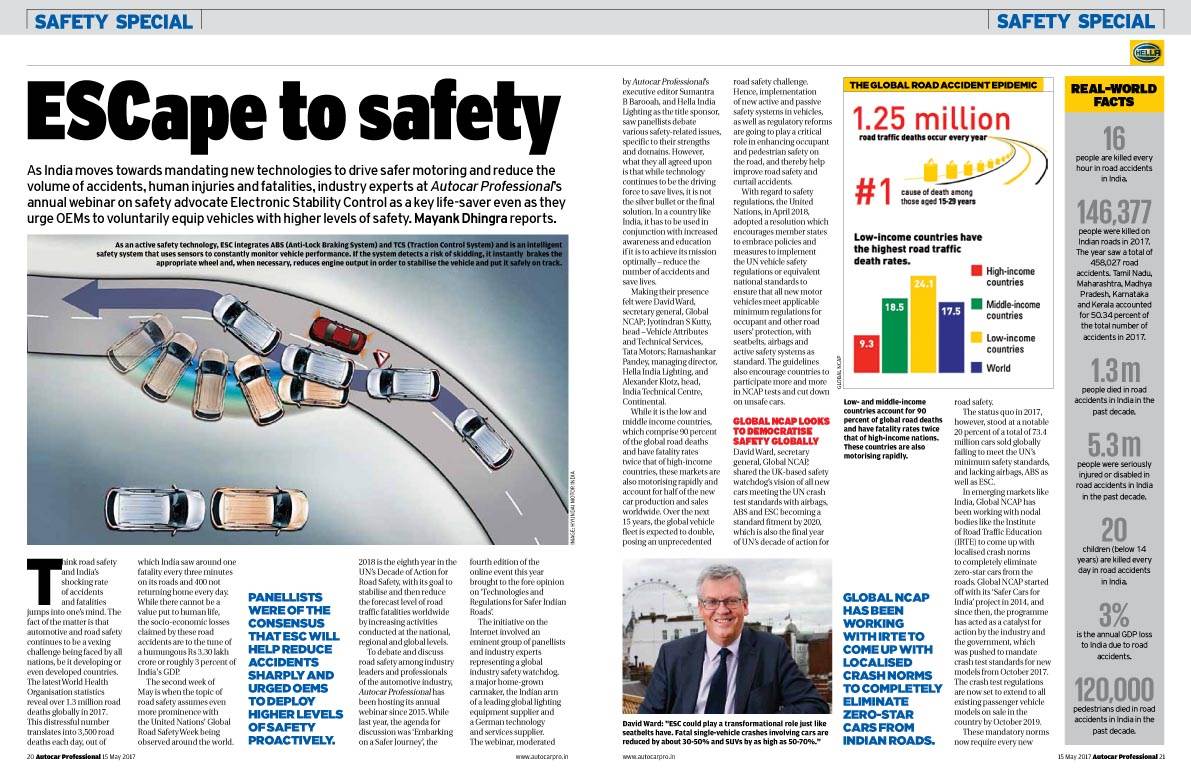
Among the many pointed suggestions which also saw the industry experts urge OEMs to voluntarily equip their vehicles with higher levels of safety ahead of any mandate, the one which stood out is the need to push the life-saving Electronic Stability Control (ESC)technology in the Indian market. Many studies have shown ESC, the most important safety technology since the seatbelt, to be highly effective, avoiding single vehicle crashes by around 30 percent.
ESC is now mandatory in Australia, Canada, the EU, Israel, Japan, New Zealand, Russia, South Korea, Turkey and the USA, and will soon also be in Argentina, Brazil and Malaysia.
India, with its hoary record of road accidents, is where global safety experts and organisations are focused on. In end-April, the International Research Council on Biomechanics of Injury (IRCOBI) held a three-day Asia conference in Lonavla. The event saw domain experts conduct in-depth sessions on various aspects of road safety, the latest tech used in road crash investigation and the release of a number of research papers. Our detailed report reveals all.
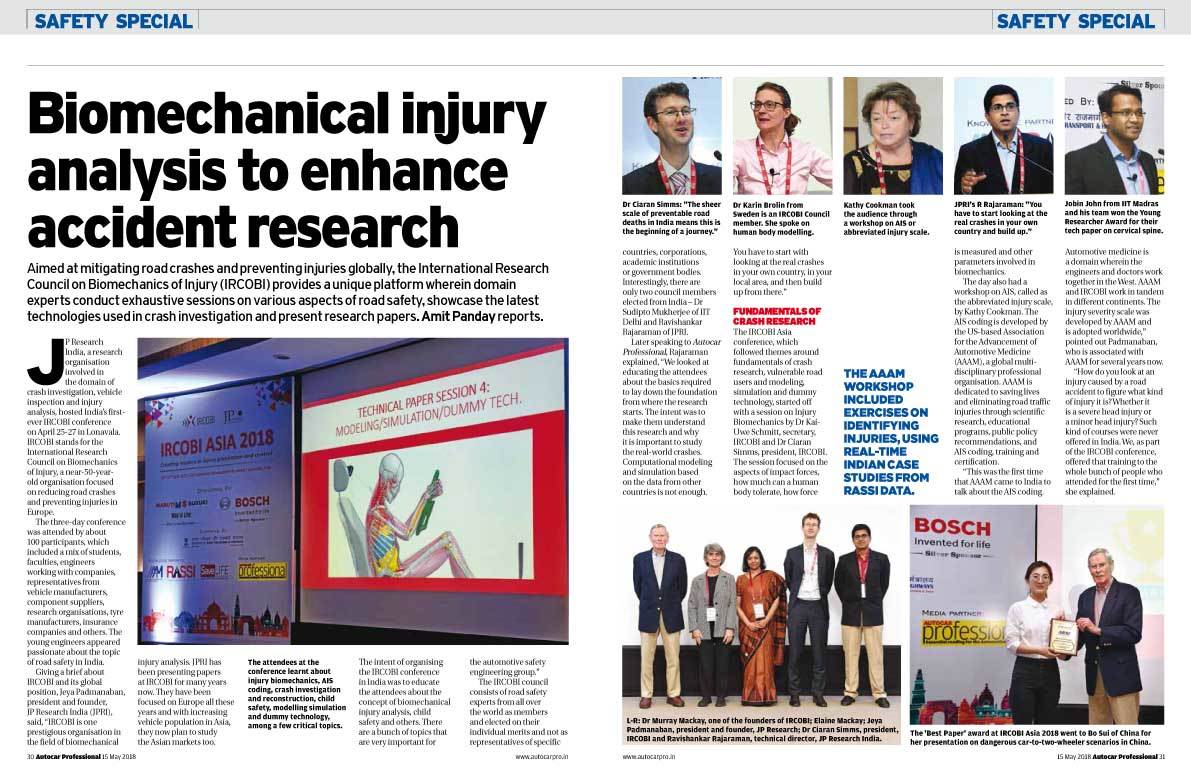
We also speak to Jeya Padmanaban, president and founder of JP Research, which is actively engaged in crash investigation, vehice inspection and injury analysis to improve road safety in India. In this exclusive interview, she speaks on a varied range of issues including why the Indian government needs to improve its data collection efforts and the quality of data so that it becomes much more reliable for the entire nation.
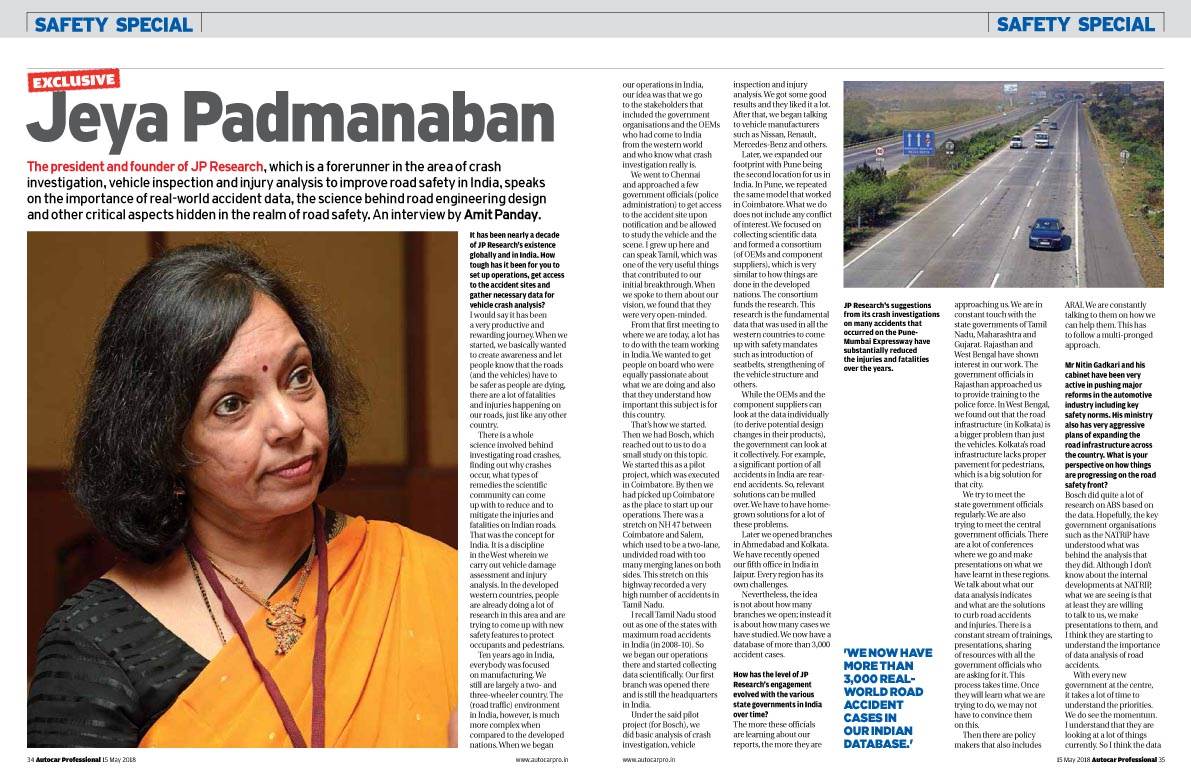
Of the vehicles involved in road accidents in India, commercial vehicles account for nearly 30 percent. Having skilled drivers to man CVs is critical for a safer India. CV major Ashok Leyland is doing its bit and more to train skilled drivers. Since opening its driver training program in 1995, the company has trained over a million drivers from its eight Driver Training Schools spread across the country. We reveal how the company is going about this laudatory exercise and is also looking to make the profession of a driver a respectable one in the country.
The component industry is essaying its role too on the safety front and companies like Wabco are accelerating introduction of their safety technologies. From air disc brakes to ESC and its Intelligent Trailer Program, the company is enabling CV manufacturers to make their vehicles safer.
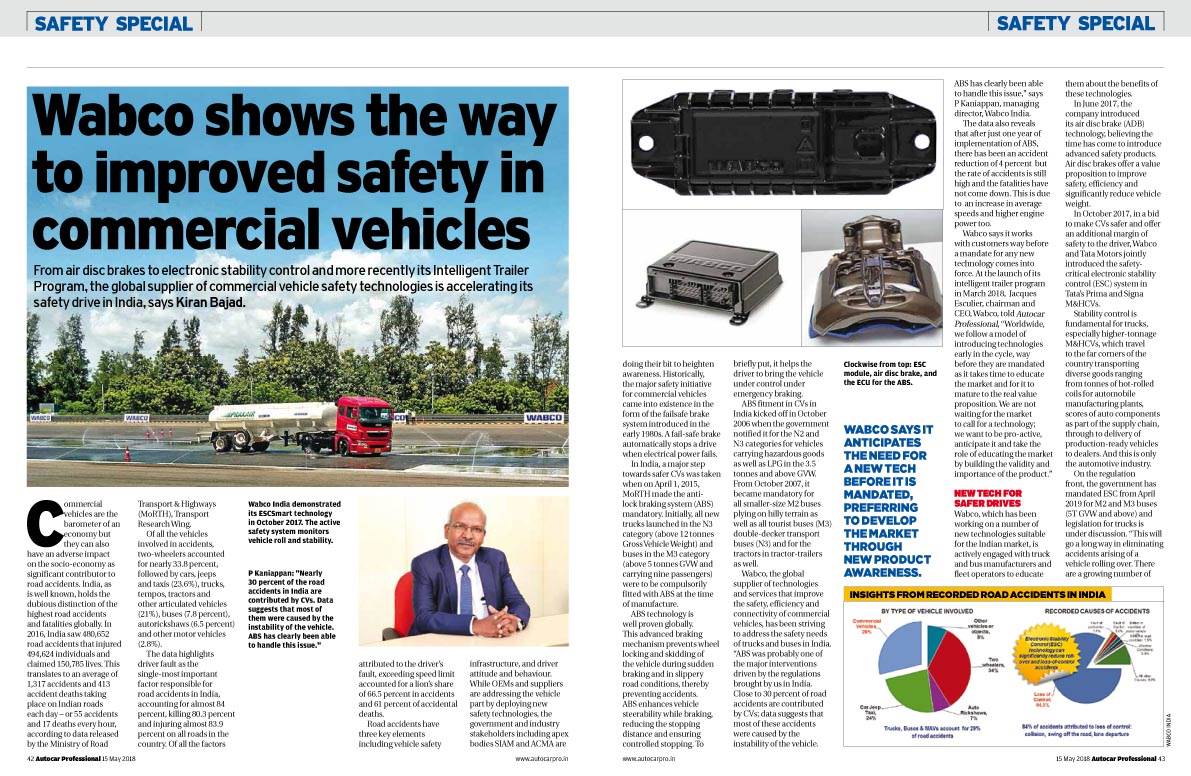
Safety equipment can spell business opportunity too and upcoming mandates for standard fitment of airbags in passenger vehicles and ABS/CBS in two-wheelers in India could turn out to be a Rs 7,500 crore business for suppliers. We have an in-depth analysis.
Indian startups are making news and we bring you an exclusive from Bangalore. Horus Intellisys has developed a collision avoidance system which can be integrated into both two- and four-wheelers and helps keep the rider/driver safe through aleerts in real-time.
Want more? You got it. In his exclusive column on 'Democratising Safety' for Autocar Professional, Global NCAP's David Ward writes on how the combined effect of new regulation and the test results of the 'Safer Cars for India' campaign are raising levels of occupant protection, why there's a dire need to accelerate deployment of ECS in India, and why much more needs to be done to improve road design, enforcement and traffic management.
Another safety crusader, Piyush Tewari, founder and CEO of SAVELife Foundation, writes on the road to zero road crash fatalities. Among other things, he decries the ad hoc approach to road engineering in the country among a host of issues which he deals with in his column.
Connected vehicles can also save lives. But with cars turning into computers on wheels and becoming an extension of their owner's desire to stay connected 24/7, what the vehicle needs is reliable and secure high-capacity storage seolutions. Which is why the US-based Western Digital is bullish on the Indian market. We speak to Vivek Tyagi, director - Sales, India Region, Western Digital Corp.
Meanwhile, with oil on the boil and petrol/diesel prices rocketing upwards in India, expect fuel-sipping vehicles to sell well in FY2019. In our analysis of April 2018 numbers, a trend which is beginning to make itself felt is the moderating of growth in the booming SUV and scooter segments in favour of passenger cars and motorcycles. Clearly, in these days of pricey fuel, vehicles that s-t-r-e-t-c-h every ounce of fuel to the maximum will gain more attention from the vehicle buyer.
We've also got some lux appeal in this issue. Mercedes-Benz India is aggressively growing the market. Find out why the German carmaker is betting on its AMG 43 models even as it launches the hot and happening AMG E 63 S, the most powerful S-Class ever.
We speak to Vikram Pawah, president, BMW Group India, on the enduring appeal of the Mini brand, the comoany's strategy in the competitive luxury car market, evaluating plug-in hybrids for India, expanding the BMW Motorrad dealer network and setting up a new vehicle and parts distribution centre.
All this plus an exciting News section in this 72-page issue.
Where to buy?
Autocar Professional magazine is available through select newsagents and for digital download from Magzster.
You can also buy one-off copies of Autocar Professional magazine – contact Ganesh at ganesh@haymarket.co.in or write to us at autocarpro@haymarketsac.com. Alternatively, never miss an issue: subscribe to Autocar Professional magazine today.
RELATED ARTICLES
Bosch hydrogen engine tech-powered truck to be on Indian roads this year
The global supplier of technology and services is betting big on both electromobility and hydrogen. While announcing the...
IIT Bombay inaugurates Arun Firodia Research Floor
IIT Bombay, one of India’s top technical and research institutions, honours Kinetic Group chairman Dr Arun Firodia, one ...
Maruti Suzuki expands capacity at Manesar plant by additional 100,000 units
New assembly line at Plant A expands total manufacturing capacity at the Manesar plants to 900,000 units per annum. Alon...





 By Autocar Pro News Desk
By Autocar Pro News Desk
 15 May 2018
15 May 2018
 6786 Views
6786 Views



